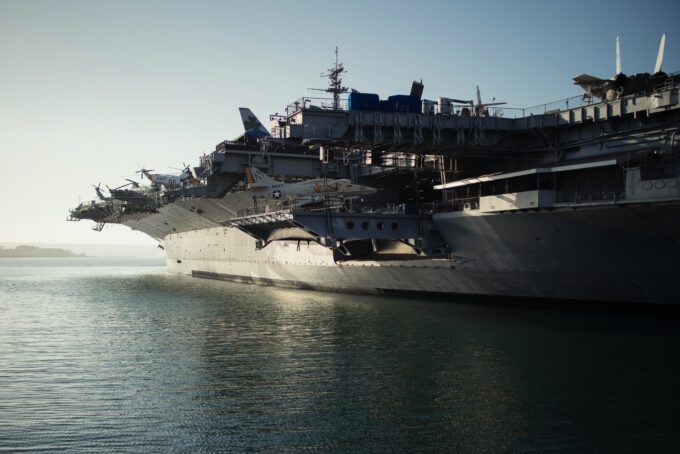
Image by Michael Afonso.
In an already volatile Middle East, the United States’ strike on Iran’s nuclear facilities—hot on the heels of Israel’s sustained military aggression—has turned tension into tinder. With missiles flying and diplomacy in freefall, what we’re witnessing is not just the prelude to another regional war, but the unmasking of a world order where legality is selective, sovereignty is disposable, and power—not principle—decides whose weapons are threats and whose are “deterrents.” This moment is not merely about Iran or Israel but about the collapse of global credibility, the weaponization of international norms, and the alarming ease with which the powerful rewrite the rules.
Despite Iran’s repeated assurances that its nuclear program is for peaceful purposes, it continues to be framed as a global menace. In contrast, Israel—widely recognized as the only nuclear-armed state in the Middle East—remains shielded from scrutiny, despite carrying out thousands of military operations across the region, including what many now describe as genocide in Gaza. Yet it is Iran that is accused of destabilizing the region. Comparing the nuclear postures of both countries also reveals stark disparities in transparency, accountability, and international compliance. Israel, though it has never formally acknowledged its arsenal, is estimated to possess between 90 and 400 nuclear warheads, capable of delivery via land-based missiles, submarines, and aircraft—a full nuclear triad. It is not a signatory to the Nuclear Non-Proliferation Treaty (NPT), and it bars the International Atomic Energy Agency (IAEA) from inspecting its nuclear facilities. Operating under a deliberate policy of “nuclear ambiguity” (amimut), Israel continues to reject inspection, disarmament talks, and global accountability.
Iran, on the other hand, has been an NPT signatory since 1968 and has subjected its nuclear program to years of IAEA monitoring. The 2015 Joint Comprehensive Plan of Action (JCPOA) was a landmark non-proliferation agreement that placed stringent limits on Iran’s uranium enrichment, drastically reduced its nuclear stockpile, and opened its facilities to international inspections in exchange for economic relief. These gains unraveled in 2018 when the United States unilaterally withdrew from the deal and reimposed severe sanctions, pushing Iran toward reduced compliance. With negotiations in disarray after U.S. and Israeli airstrikes in Iran, hopes for de-escalation are fading. It would not be an exaggeration to say that these recent attacks give Iran renewed moral justification to pursue nuclear capabilities, given the escalating security threats it faces. Unfortunately, while Iran bears the brunt of sanctions, isolation, and targeted attacks over a nuclear program with no confirmed weaponization, Israel remains largely spared from criticism—a glaring double standard. If Israel’s recent strikes on Iran are justified as preemptive action against a perceived existential threat, the world must also ask: what imminent danger did Gaza pose that warranted the deaths of nearly 50,000 Palestinians since October 2023? What nuclear threat was neutralized in Gaza that justified the destruction of its infrastructure and hospitals, the decimation of 84% of its healthcare facilities, and the severe shortage of life-saving medicine?
What kind of existential threat do starving, blockaded civilians pose to justify Israel’s continued obstruction of food and humanitarian aid? Thousands of children have been killed, orphaned, or permanently displaced. Those who survive carry both physical and psychological scars. According to UNICEF and the World Health Organization, Gaza is now one of the most dangerous places in the world to be a child. While Israeli missiles have recently targeted Iranian nuclear scientists, the brutal irony is unavoidable: what threat, exactly, did Gaza’s starving children pose to justify such overwhelming force?
This moment marks a perilous precedent: a world in which violence against weaker states is normalized, so long as it serves the interests of powerful allies. The United States has long played this game—most notably in Iraq, where the 2003 invasion was justified with false claims of weapons of mass destruction. Today, a similar narrative is being deployed to justify aggression against Iran, thinly veiled as preemption but transparently aimed at regime change and strategic control. Who empowered the U.S. to decide which nations may pursue nuclear capabilities and when they should be destroyed? What purpose does the IAEA serve if its protocols are selectively applied?
The truth is, the international community’s silence is not due to inaction, but to a systemic failure—rooted in political protection and upheld by the shield of veto power. The United States has blocked nearly 50 UN Security Council resolutions seeking to hold Israel accountable. Most recently, it was the lone dissenting vote against a resolution calling for an immediate and unconditional ceasefire in Gaza—despite support from 14 other nations. This protection has effectively erased the line between U.S. and Israeli policy, making it difficult to discern where one ends and the other begins. Despite Donald Trump’s repeated claims that he would not go to war, the violations of Iranian sovereignty make one thing clear: when it comes to Israeli aggression, America is indeed a friend. With this posture of belligerent arrogance, Trump aspires to a Nobel Peace Prize—as if winning it is as easy as handing out U.S. vetoes at the United Nations.
To recapitulate, this crisis is not merely about the United States, Israel, or Iran; it reflects a broader failure of the international system. A world order that rewards militarism, shields impunity, and lets powerful actors defy global norms without consequence is one dangerously adrift. The question now is not whether the world is at a turning point—it is whether it will turn at all. Will global institutions rise to uphold the very principles they were founded on, or continue as silent instruments of the powerful—masking injustice in the garb of diplomacy? If this trajectory continues, history will not remember this as the beginning of another conflict. It will remember this as the moment when the world chose silence over justice, complicity over conscience, and power over principle.
The post Friend in Aggression: Why the U.S. is the Real Global Menace appeared first on CounterPunch.org.
This post was originally published on CounterPunch.org.